Top 10 Health Benefits of Carrots
Carrots are a true superfood since they are not only nutritious but also versatile. You undoubtedly heard as a child that carrots are excellent for your eyes. ... read more...That is correct, however, the advantages of carrots do not end there. Here are some more health benefits, as well as simple, healthy ways to enjoy the lovely root vegetable. Let's look at the finest carrots' health advantages.
-
One huge carrot can deliver more than 200 percent of the daily vitamin A requirement. This essential vitamin (which serves as a cell-protective antioxidant) promotes lung and skin health and has been linked to a reduction in cognitive decline. It also helps with vision. A vitamin A shortage can cause xerophthalmia, which can impair normal vision and culminate in night blindness.
Carrots include the antioxidants lutein and zeaxanthin, which improve eye health. The two natural substances shield the retina and lens from damage. According to a study published in the American Journal of Opthalmology, women who ate more than two servings of carrots per week had a 64% reduced chance of getting glaucoma than women who ate less than one serving.
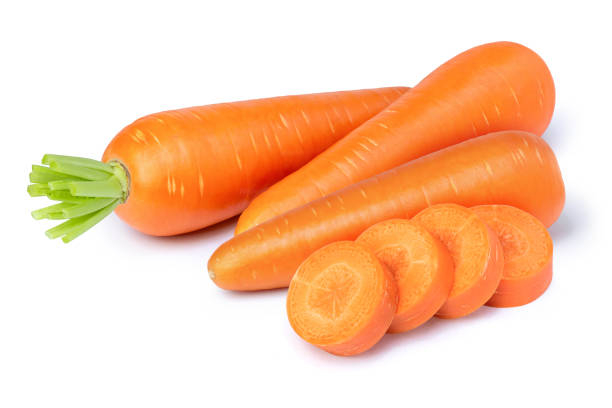
Boosts eye health 
Boosts eye health -
Carrots help to keep your heart healthy and your life longer. According to research, women who consume more orange-colored veggies had a decreased chance of acquiring heart disease. Other research suggests that carrot juice might assist the body to protect itself against the threats of cardiovascular problems by neutralizing the harm produced by oxidation. Carrots have an additional advantage in lowering cholesterol.
Carrots affect and promote bile production, which assimilates fat deposits in your body. Lowering cholesterol is critical, especially for persons with a family history of heart disease, so don't forget to include carrots in your next meal. One Dutch study investigated the extent to which different fruit and vegetable color groups contribute to heart health. Researchers discovered that increasing your consumption of deep orange vegetables by 25 grams per day was inversely related to heart disease. Carrots, for example, were linked to a 32% decreased risk of heart disease.

Benefit heart health 
Benefit heart health -
When it comes to vitamin A, carrots are a nutritional powerhouse. You'll get all of the vitamin A you need for the day regardless of which carrots you pick. A cup of raw carrots, for example, has 408 percent of the daily value, but a cup of boiling carrots contains 532 percent. Vitamin A from meals is converted by your body into retinoids, which interact with your cells and tissues. According to a review published in the Archives of Biochemistry and Biophysics in April 2015, certain forms of vitamin A communicate with your fat cells and impact new fat cell formation, fat accumulation, and obesity.
According to the analysis, vitamin A may play a role in lowering abdominal obesity, which is a severe health concern. Getting additional vitamin A may also improve your health if you need to drop a few pounds. Obese people have low quantities of vitamin A in their tissues, according to a November 2015 study published in Scientific Reports. Carrots also contain a few other nutritional advantages that may aid in weight loss. They provide a tiny but considerable quantity of fiber per serving — 14% of the daily value in a cup of raw carrots and 18% in a cup of cooked carrots.

Aid weight loss 
Aid weight loss -
According to research published in the American Journal of Cancer Research, alpha-carotene and bioflavonoids present in carrots have been linked to a decreased risk of cancer, particularly lung cancer. Carrot antioxidants have been linked to a lower risk of numerous malignancies, including lung, colorectal, prostate, and leukemia. Carrots can help prevent cancer.
Dr. Kirsten Brandt and colleagues from Newcastle University's School of Agriculture, Food and Rural Development discovered in 2009 that roasted whole carrots are "better at combating cancer". The British daily The Independent broke the story first. According to the newspaper, the study discovered that cooking carrots whole has 25% more of the "anti-cancer ingredient" falcarinol than cooking them diced up beforehand.
A previous study had shown that falcarinol reduced the growth of isolated cancer cells and tumors in rats, suggesting that this might be the active element in carrots, according to the researchers. They also stated that, while carrot consumption is significantly connected to a lower risk of cancer, the active element is unclear, and that the widely held idea that beta-carotene in carrots prevents cancer may not be entirely correct. They cited four-year-old animal research that found rats fed a diet including carrots or purified falcarinol were one-third less likely to develop tumors than those in a control group.
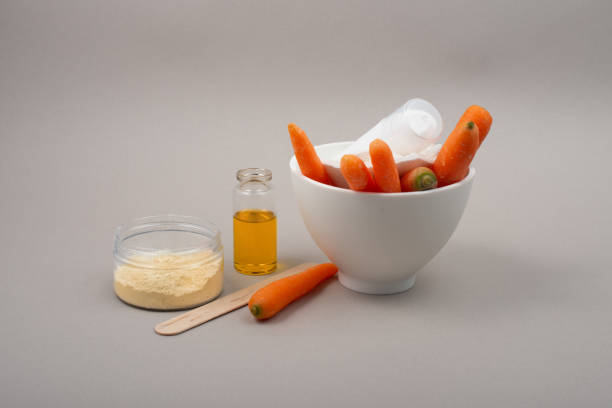
Lower cancer risk 
Lower cancer risk -
While carrots are well known for their vitamin A content, they also have a high potassium content. Potassium has been demonstrated to reduce blood pressure in many ways. Your kidneys filter your blood and eliminate waste. They require a healthy mix of water, salt, sodium, and potassium to perform this effectively. If you have too much sodium or not enough potassium in your body, your kidneys will be less efficient in removing extra fluid. The American Heart Association advises 4,700 mg of potassium and 1,200-1500 mg of salt per day. Carrots contain 410 milligrams per cup.
Vitamin C is well-known for its immune-boosting properties, but it also helps with blood pressure. One cup of carrots delivers 13% of the daily required amount of vitamin C. So, how can vitamin C aid with blood pressure? Oxidative stress can cause damage to the walls of your blood vessels. Vitamin C's antioxidant properties can help protect your blood vessels from damage. Furthermore, vitamin C improves the availability of nitric oxide. This is significant because nitric oxide relaxes the walls of your blood vessels. A relaxed blood artery allows blood to flow more easily enabling the heart to perform more efficiently.

Lower blood pressure 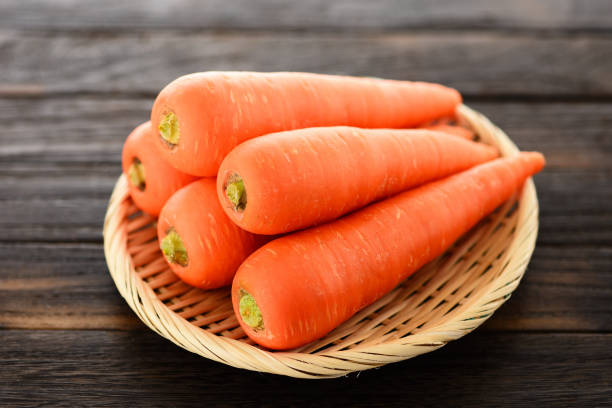
Lower blood pressure -
Carrots significantly improve your overall health. Because of their rich vitamin and mineral content as well as their low-calorie count. Carrots, in particular, offer several benefits to your teeth. Learn about the five benefits of carrots for dental health. Between meals, plaque and tartar accumulate on your teeth. If not addressed quickly, this can lead to tooth decay. The thick texture of carrots, which is slightly abrasive when chewing, will naturally break away plaque and tartar on your teeth.
Carrots protect your teeth from dangerous microorganisms that cause plaque buildup and tooth damage. This is due to the fact that carrots work as natural toothbrushes, with the structure of the carrot's fibers rubbing away particles of food on your teeth that might create cavities or other issues. Carrots also need a longer duration of steady chewing than other meals. As a result, they increase the amount of saliva produced in your mouth. This saliva will then break down plaque and tartar further and wash it away, keeping your teeth and gums strong and healthy.

Good for oral health 
Good for oral health -
Carrots include vitamin C, which is essential for immune support and healing. Vitamin A in the vegetable also helps the immune system by producing and preserving mucous membranes, which function as barriers to keep germs out of the body. Carrots are high in vitamins, minerals, and antioxidants such as vitamins B6 and K, potassium, phosphorus, and others that promote bone health, a stronger neurological system, and improved cognitive function. Aside from protecting the body from free radical damage, antioxidants also protect it from dangerous germs, viruses, and inflammation.
Cell membranes throughout the body, particularly those in the immune system, are protected by vitamin E. Getting enough vitamin E may be especially essential for the elderly. T cells, which are immune system cells, lose their capacity to combat infections. According to research published in the October 2008 edition of the "Journal of Leukocytic Biology", vitamin E restores some of the age-related abnormalities in T cells and may boost their ability to fight infections in the elderly. One big carrot has 3% of the daily value for vitamin E.

Boost immune system 
Boost immune system -
Carrots are low in calories and salt while being high in vitamins and antioxidants. They are most recognized for their high vitamin A content, which aids with eye health. Carrots include Vitamin A, which aids in skin tissue healing and protects against UV radiation. They are also abundant in beta-carotene anti-oxidants. Carrots are excellent for your skin, and they are also helpful for your digestive system.
Carrots are known to be high in antioxidants. Carrots include antioxidants that help protect your skin from UV damage. It contains beta-carotene, which your skin needs to build immunity against the sun's damaging rays. This keeps us from becoming sunburned. Beta-carotene, which is turned into vitamin A in the body, is essential for healthy skin. Many topical oily skin creams already include vitamin A. Carrots can also help you get more Vitamin A! Continue eating carrots and drinking carrot juice. Wrinkling is caused by a lack of collagen in the skin; collagen synthesis decreases with age, so eat some carrots to keep that aging at bay.
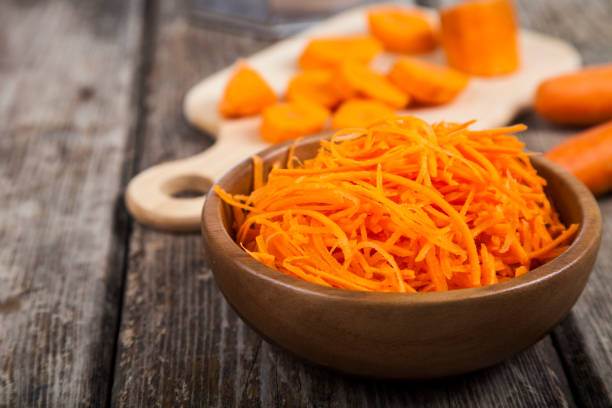
Benefit skin health 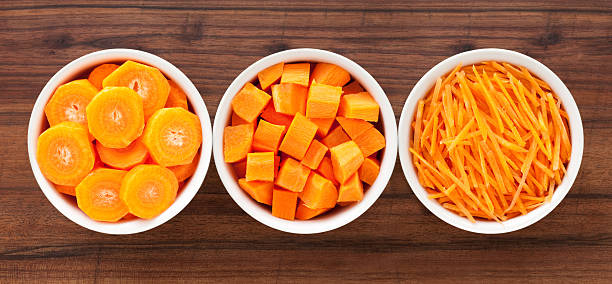
Benefit skin health -
Carrots have a low glycemic index (GI), which is a scale from one to 70 that reflects how much food might cause your blood sugar to jump. Food is termed low glycemic if it does not raise your blood sugar quickly, and high glycemic if it raises blood sugars quickly. Low glycemic foods often have a GI of 49 or below. Controlling blood sugar levels and reducing spikes with low-glycemic meals is important for everyone, but it is especially important for those with prediabetes and diabetes since it helps them manage their disease.
Cooked carrots have a GI index of roughly 39, whereas items like bread, potatoes, or snacks like crackers have a GI index of 70 or higher. Carrots do not normally raise blood sugar levels, making them an excellent choice for snacks or side dishes. Cooked carrots have a lower glycemic index than raw carrots. Also, if you're going to cook your carrots, watch what you put in them. A balsamic, honey glaze, for example, will likely raise the GI more than adding nuts and a sprinkle of cinnamon.

Aid in controlling blood sugar 
Aid in controlling blood sugar -
Carrots are high in dietary fiber, an indigestible carbohydrate present in plant diets. Carrots are a good source of both types of fiber, which are soluble and insoluble. A 1-cup portion of sliced, cooked carrots, for example, has around 3.5 grams of fiber overall, with roughly equal quantities of each kind. Despite the fact that it contains no nutrients, fiber is essential for intestinal health. Healthy individuals require between 20 and 30 grams of fiber each day.
Carrots' insoluble fiber aids in the smooth passage of food through your digestive tract, giving weight to your stool and aiding in the prevention of constipation. Insoluble fiber may also reduce the risk of some digestive diseases. Carrots are also high in calcium and potassium, with a 1-cup serving of raw, sliced carrots providing around 40 milligrams of calcium and 400 milligrams of potassium. Both minerals are essential for the appropriate muscular contraction of all kinds, including smooth or involuntary muscle found in the stomach, intestines, and colon. After eating, repetitive contractions of this muscle layer assist transport of food through the digestive tract, thus getting enough of these minerals is critical for proper digestion.

Benefit digestion 
Benefit digestion































